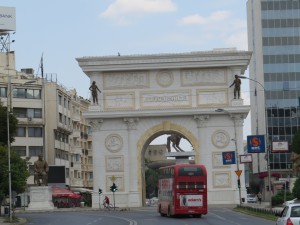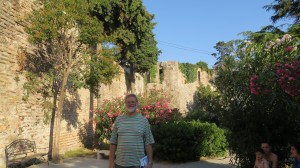Dancho maintains that Elin Pelin’s Roast Pumpkin is untranslatable
See what you think:
Roast Pumpkin
By Elin Pelin
Translation©Christopher Buxton 2013
Once when Christy Goodheart, the District Council archivist, brought a document to his boss’s house for him to sign, he found the Chief Executive with his wife and children tucking into a whole roast pumpkin, fresh from the oven.
When the Chief executive had signed the document, he cut a small piece of pumpkin and kindly offered it to his archivist.
“Go ahead, Mr Christy, just you try this excellent pumpkin. It’s only a little burnt, but never mind. You’ll excuse us.”
“Oh thank you, thank you, Mr Chief Executive” the embarrassed archivist replied , “I, how can I put it…I don’t like pumpkins.”
“How can that be? You’re from a village, good Heavens, how can you not like pumpkin?”
Angel really didn’t like being reminded of his village origins. He blushed deep red from shame.
“Yes but….you know my stomach, Mr Chief Executive, it’s no longer used to such stuff,” he replied as he shook his head and frowned.
He could not keep his eyes off the sugar coated pumpkin slice with its seductively browned crispy skin and his throat filled with saliva. He didn’t dare swallow, terrified that they’d sense his weakness.
“Come on, help yourself, don’t be shy, man!” his boss urged him kindly, “It’s been so many years since I put pumpkin in my mouth, and even so my stomach can take it.”
“I can’t, Mr Chief Executive, it unsettles my stomach, I can’t taste it even!” Angel replied, thinking to himself: look what a bumpkin I’m turning out to be, I should have accepted it!
And so as not to be tortured a moment longer, he bowed, humbly bid goodbye and left.
Only when he was out on the street, he felt free to swallow his saliva and again took himself to task.
“I’m a bumpkin, a bumpkin and there’s an end to it! If they chase you – run, if they give you something – take it, but where was your head, man!
And Christy stabbed his head with a disapproving finger. The tasty slice of pumpkin swam again before his eyes – beautiful, hot, sweet and over it all there wafted such an exquisite steam.
“Point of fact, if there’s something I love more than anything else in the world, it’s roast pumpkin,” he began to consider this as he walked down the street with head down. “I eat it like a pig! But what a bloody stupid name! Pumpkin! It sounds so cretinous, damn it. Stupid, country-bumpkin thing! They’ll say, this bloke, this bloke eats pumpkin – get rid of him – a man with no culture, simpleton, in a word a pig. Sometime I’ll go to the village, I’ll just eat pumpkins! Far away from folk!
And his imagination began to set in front of him only pumpkins, sweet, lovely and savory.
From that day on, Christy became unsettled and edgy. The image of roast pumpkin began to haunt him.
Sitting at his office desk,, the thought gnawed at him. If he wrote something, he wrote till he was exhausted. But still it seemed to him that the pen as it scraped on the page, whispered pumpkin, pumpkin…
If he quarreled with his office colleagues, he’d straightaway call them roast pumpkins or “Why are you blushing like a roast pumpkin” or “Just look at yourself please, what a drunkard – there’s steam coming off your cheeks like a roast pumpkin!”
At night while he slept the image of a pumpkin tormented him. He dreamt of a field, but what a field! Long and wide, you couldn’t see where it finished. And those there pumpkins were rolled out over it and over each one there wafted such a sweet steam.! Christy wandered over the field, looked at the pumpkins and wanted to pick them up, but when he bent down, the pumpkin disappeared. He was walking over the field again. Field, but it wasn’t a field, but some kind of office, like an enormous office! There somewhere an enormous pumpkin appeared and began to roll towards him and it was growing bigger and bigger, bigger than a house, a church, a mountain, bigger still and it began rolling stronger and quicker towards him. Christy shook with fright and his legs grew shorter and shorter. The monster pumpkin reached him and flumped on him.
The archivist shook and woke, swimming in sweat.
This dream tormented him every night.
One evening the Council clerks had a party.
They cooked a stew at Cal’s pub and they got together to celebrate. They’d made the stew chili-hot so they would drink more wine. The archivist was of course invited.
Wine, speeches, songs! Love songs if you want, patriotic songs. Afterwards they raised their glasses. They drank the health of the chief Executive, provided he stayed in post of course, they drank to the beautiful women in the town, the greatness of Bulgaria, the Tsar, the Bulgarian nation, the fleas in the office etc. etc.
At last Mr Christy got up on a chair, cleared his throat and lifted his glass in high spirits.
“Good sirs, honoured folk here assembled, colleagues, my good comrades!”
But in the midst of this torrent of words that horrible roast pumpkin rolled unceremoniously into his thoughts, that same pumpkin that continually pursued him and in his head churned up the archive of ideas, gathered over forty years of service.
Christy tried to continue. He gestured strongly with his arm, and as he reached up to the low ceiling, he held his ceremonious pose a few minutes, casting his eyes excitedly over his colleagues.
“ With my feet well set, so to speak…in part….more or less…
But the pumpkin again rolled into his thought stream. Christy felt quite helpless. He let his arm drop. He turned to his colleagues and spoke in a mild, sensitive and gentle voice, far removed from any orator’s pathos.
“Do you know what gentlemen, let’s just once roast a pumpkin! Nice and friendly like. It doesn’t cost God knows what. And we’ll still enjoy ourselves.”
There followed a short period of silence. Then everyone shouted Hurrah and Cal’s pub erupted in applause.
“Motion passed! Motion passed.”
“This very evening!” a voice shouted out.
“Mo-otion pa-a-assed!”
And inside five minutes, they collected signatures, collected the requisite sum, bought a pumpkin and sent it to the kitchen. Christy sank into happy thoughts.
And when after an hour the pumpkin was roasted, he demanded to fetch it himself and left.
But…
Just as he was returning in the dark with the tray over which wafted the aroma of roasted pumpkin, who should he meet but the Chief Executive.
“A-ah My Christy,” he cried. “Well it’s you who’ve roasted the pumpkin…Very gratifying, It’s very gratifying. I’m sure your stomach’s now fully recovered!”
Christy swallowed his tongue and couldn’t utter a word.
When he brought the pumpkin to his colleagues, everyone of them noticed that he’d gone as yellow as a corpse.
“What’s up with you?” They asked in wonder.
“Not feeling very well!” Christy replied as he flopped onto a chair in the corner and stayed there downcast and dumb. Sunk into some dark musing, he didn’t even look at his colleagues as they ate the sweet pumpkin with joy and relish.
“Christy, won’t you take a slice, mate,” they urged him.
“I don’t feel like eating” he replied miserable and crushed as he tearfully insisted: “I’m sick. I’m really sick, lads! I’m going to die.


